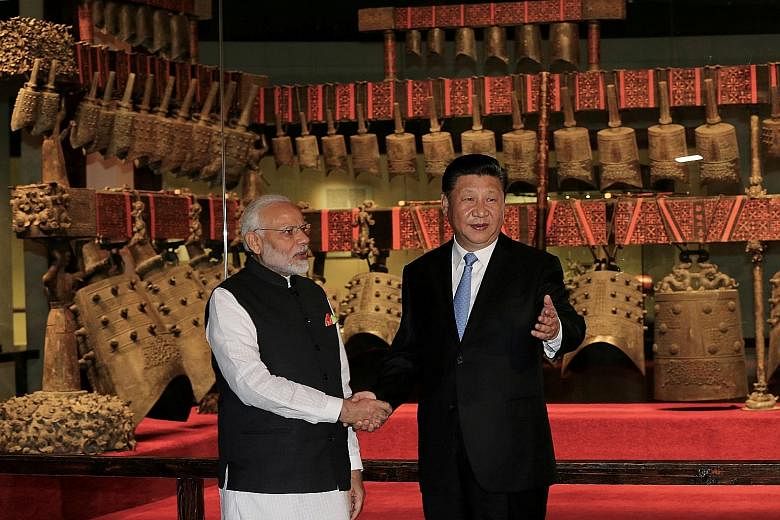China's President Xi Jinping will be in India tomorrow for an informal summit with Prime Minister Narendra Modi as the two sides attempt to boost ties, which took a hit because of Beijing's stand on Kashmir.
During his two-day visit, Mr Xi will hold talks with Mr Modi at the temple town of Mamallapuram - also known as Mahabalipuram and which dates back to the 7th century - some 56km away from Chennai, the capital of the southern Tamil Nadu state.
The two leaders will also sit through a cultural programme and visit ancient temples and monuments, all part of an effort to strengthen ties at the highest level since the last informal summit last year in Wuhan in China.
A press release from India's Ministry of External Affairs said the summit "will provide an opportunity for the two leaders to continue their discussions on overarching issues of bilateral, regional and global importance".
China's Ambassador to India Sun Weidong expressed the hope that the "strategic guidance and friendship" of both leaders would usher China-India ties into a new chapter.
"With growing uncertainty in the international situation, China and India should strengthen cooperation on international and regional affairs," he said in a tweet.
China is India's largest trading partner; bilateral trade reached US$89.71 billion (S$123.9 billion) in the 2017-2018 financial year.
But the two countries have a festering border row, and ties nosedived to an all-time low after a dispute exploded in 2017 over Doklam, an area strategically close to India's Silliguri Corridor, a narrow stretch of land that connects the country's north-east to the mainland.
The border stand-off was resolved through diplomacy and the two countries put ties back on track following the informal summit in Wuhan.
Now, ahead of the second summit, Kashmir has emerged as a new area of concern.
India's decision to remove autonomy from Kashmir led to opposition from Pakistan and its close ally China, which brought up the matter in the United Nations Security Council last month in what was seen as an effort to internationalise the issue.
Both Pakistan and India claim Kashmir in its entirety.
Beijing also objected to the change in the status of Jammu and Kashmir, which includes parts of Ladakh that China claims as its own territory in a long-running dispute over their 3,500km border.
Still, two days before Mr Xi's visit, Beijing has sought to improve the atmospherics by aligning with India's position on Kashmir, saying it remained a bilateral issue between India and Pakistan.
But Xinhua news agency said President Xi had told Pakistan Prime Minister Imran Khan that Beijing supported Islamabad on issues related to its core interests.
"There have been wide gaps between our expectations and the Chinese (on Kashmir)... I think a certain chill came into the relationship. This (summit) is supposed to set things right at leaders' level," said former Indian foreign secretary Lalit Mansingh.
"I don't think there is a crisis situation. It's just that there is a chill in ties," he said.
Jawaharlal Nehru University Chinese studies professor Srikanth Kondapalli said: "The turnaround on Kashmir is probably a tactical, not a strategic, decision."
There are many areas of divergence between New Delhi and Beijing, including on China's close ties with Pakistan, India's growing ties with the US and the US role in the Asia-Pacific region.
The two leaders are expected to focus on building the economic relationship and keeping border irritants contained.
Some issues under discussion between the two sides include whether India will invite Chinese technology company Huawei to be part of trials for a 5G cellular network rollout in the next few months.
India is also looking for ways to close the trade deficit with China which amounted to US$62.9 billion in 2017-2018.
Foreign policy analysts said economic issues would remain an important part of the discussions.
"India and China both have a problem (currently) in resurrecting economic growth rates. The economic relations will have an impact on ties. And both are concerned that border security should not slip and raise tensions," said Prof Kondapalli.
"There may be some headway on the Regional Comprehensive Economic Partnership... I think globalisation will be one message from Mamallapuram."

